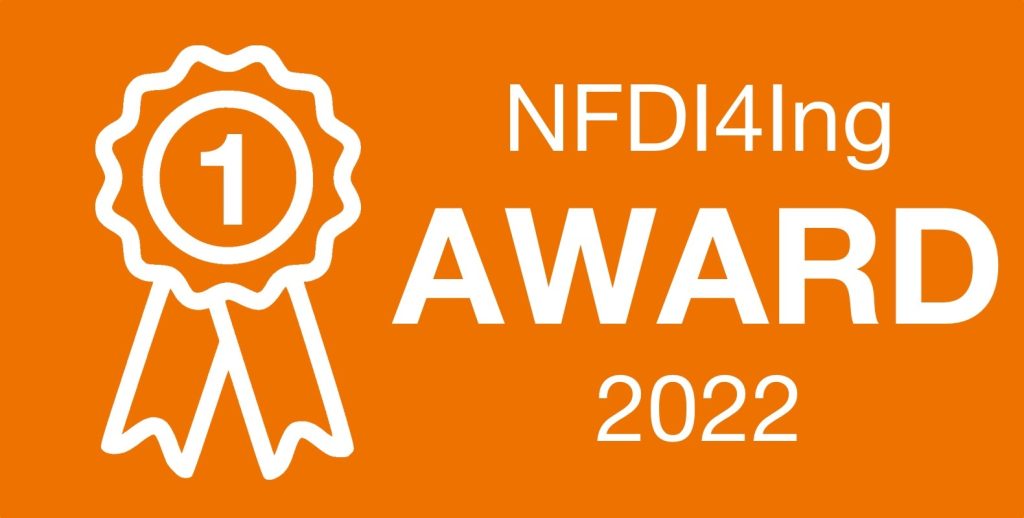
The NFDI4Ing Awards 2002 were presented at the annual NFDI4Ing conference. The award was granted in two categories: for the best RDM (software) solution created outside NFDI4Ing, and as reward for best overall conference contribution. A total of 43 applications were submitted, from which three candidates for each award were selected in a review process. Winning one award excluded from winning the other award with the same contribution. The final awards were based on the presentations at the conference, which were evaluated by a jury of five members. Each jury member represented one of the five NFDI4Ing communities (mechanical and industrial engineering, thermal engineering and process engineering, materials science and engineering, computer science, systems and electrical engineering, and construction engineering and architecture).
It was a close contest, but in the end two contributions prevailed. We happily congratulate the winners of the NFDI4Ing Awards. Wendy (Pengyin) Shan from the University of Alberta Library in Canada received the NFDI4Ing Award 2022 for the best Conference Contribution with her presentation “Prepare RDM for Decentralized and Blockchain-Based Data Sources”. Rory Macneil from Edinburgh in Scotland won the NFDI4Ing Award 2022 for the best RDM Solution with his contribution “RSpace: An Electronic Lab Notebook designed to enhance FAIR workflows and FAIRification of research data”. Both awards are endowed with 500€, sponsored by the WZL Aachen Stiftung. We congratulate the two award winners and thank all contributors for their participation! The following paragraphs describe the winning presentations and the review process in more detail.
Prepare RDM for Decentralized and Blockchain-Based Data Source
RDM groups all over the world have done amazing jobs in pushing RDM as a necessary part of the research process to ensure data integrity during research. In her contribution Wendy (Pengyin) Shan from the University of Alberta Library in Canada argues, that with more researchers using RDM, it is time to widen the scope of data sources that need to be considered in RDM to ensure that RDM will not become an obstacle for researchers to utilize data. The overall principle of RDM is to allow researchers to utilize the power of data from all possible resources while guaranteeing the data is correctly accessed, preserved, and secured. While RDM groups are primarily encouraging the usage of open-access data, the fact remains that mixed permissions for data still are and likely will be common in the age of web 3.0 for some time yet. This needs to be acknowledged and handled by RDM groups and tools. Ms. Shan concludes that RDM groups should navigate the best practices to integrate decentralized data and blockchain-carried data into RDMs and continuously look for inputs from researchers to accommodate their needs.
RSpace: An Electronic Lab Notebook designed to enhance FAIR workflows and FAIRification of research data
Rory Macneil from Edinburgh in Scotland presented RSpace, an electronic lab notebook (ELN) and sample management system. It is designed to enhance reproducibility by making experimental and sample data more findable and accessible. This is enabled with an open architecture that facilitates connectivity with relevant data used in research projects generated or stored in other tools. Data in RSpace and linked external data can also be associated with the data management plan related to the project. The data and the data management plan can then be exported to data repositories like Dataverse, Figshare, Dryad, and Zenodo, for public discovery, query, and experimental reproduction. Comprehensive data capture and availability are further enhanced through the ability to easily integrate RSpace with infrastructure, e.g., institutional file stores commonly in place at major research institutions.
Review process
For the first time, the NFDI4ing award winners were chosen by a jury. The jury gave feedback during the discussion after the presentations and asked questions about the contributions. After this, the jury completed a structured online review of the recent presentation. After the last contribution, a prepared evaluation script was used to calculate the scores for each of the presentations to select the winners. For those interested: The script was written in python and embedded into a Jupyter Notebook to document the code so that it can be reused at the next conference. It is currently being stored in a GitLab repository hosted by RWTH Aachen for the NFDI4Ing. This will be accessible at a later point here.
What’s next?
Following the conference, a special issue of ing.grid, the Open Access journal for RDM in the engineering sciences will be published in the first half of 2023. This special issue will be focused on papers by conference contributors. While it is not mandatory to hand in a paper, we strongly encourage contributors to do so!
The next NFDI4Ing conference is also just around the corner. It is scheduled for the 27th and 28th of September 2023! Save the date!
Tobias Hamann, WZL RWTH Aachen
Jan Linxweiler, TU Braunschweig
